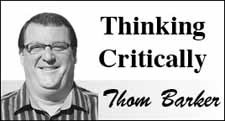As fad diets go, the "caveman diet" might not be all that bad, but its basis on ancestral human health is pseudoscience at best. The concept dates to a 1975 self-published paper by Walter Voegtlin, a gastroenterologist, entitled "The Stone Age Diet: Based on in-depth Studies of Human Ecology and the Diet of Man."
Voegtlin argued that humans are carnivores and our ancestral pre-agricultural diet was primarily protein and fat with only small amounts of carbohydrates, chiefly obtained from fruits.
It is the classic hunter-gatherer image of our forebears. I can see the appeal of this. It has a vaguely scientific sort of internal logic that obviously lends itself to feeling good about making healthy food choices. I have noticed recently numerous friends and relatives jumping on the paleo bandwagon.
The problem is it fails on a truly scientific level. The assumption is that since we started domesticating our food sources our health has suffered because human evolution has not caught up to the change in diet.
This is ludicrous. I kind of see it as the anthropomorphism of evolution. Like so many other things in our lives we tend to project human characteristics on evolution as if it is a linear process of continuous improvement. As if evolution somehow cares about our success as individual organisms.
If eating like a caveman is truly better for us, one would have to presume, from an evolutionary point-of-view, that we would be more successful as a species if we had not changed our diet. The fact is, it is precisely because we are so adaptable in our diet that we are currently the most successful species on the planet, at least in terms of our overall impact, for better or for worse.
Another assumption that gets completely glossed over in the "paleo diet" is that our Paleolithic ancestors were healthier than we are now. Again, ludicrous. Evidence strongly points to short life spans, high infant mortality and a generally tough life for our scavenging forebears.
Agriculture and the stable food sources it provided allowed us to develop all the technologies that have doubled our lifespan. Yes, there are many individual people who have diet-related health problems, largely the result of overly processed foods, the quantities we eat and a sedentary lifestyle.
In this sense, the caveman diet has some good features, focusing as it does on fresh food sources, but it can hardly be construed as truly eating the way our ancestors did, particularly since the diet of individual populations of early humans was extremely diverse dependent on what was locally available.
Ultimately it comes down to a marketing ploy and a conceit of wealth. Proof of this is that most variations of the diet allow alcohol. I've heard the argument bandied around that our Paleolithic ancestors may have imbibed in the form of fermenting fruits.
This is out and out rationalization for not giving up the things we don't want to give up regardless of whether it is consistent with the concept, much the way many religious people cherry-pick the parts of their sacred texts that are convenient to their lifestyle.
I'm not opposed to this way of eating on principle. I've seen some wonderful-looking dishes associated with the diet I would gladly eat and probably enjoy. I'm just saying it is ridiculous to think it actually resembles in any way the Paleolithic model.
And, like all the fad diets that have come before, it is not practical for humanity at large.
Those who can afford the cookbooks and ingredients, an extremely small proportion of the overall human population, can feel good and maybe lose some weight. There is nothing wrong with that, but the Paleolithic rationale behind it is not science.




